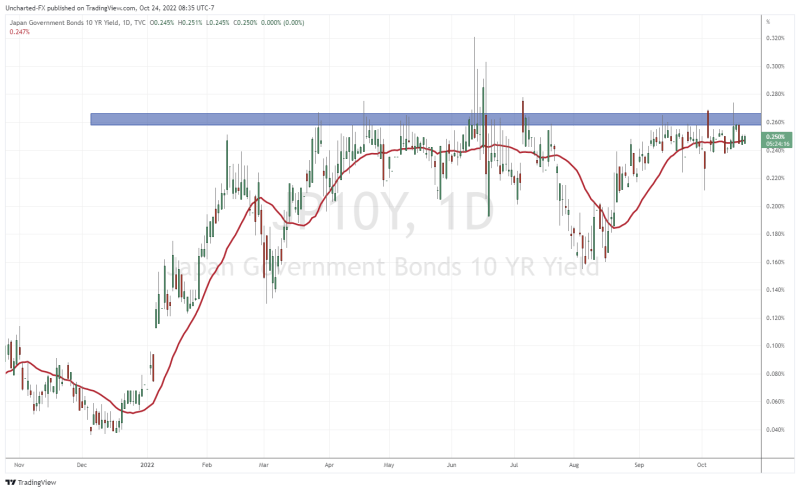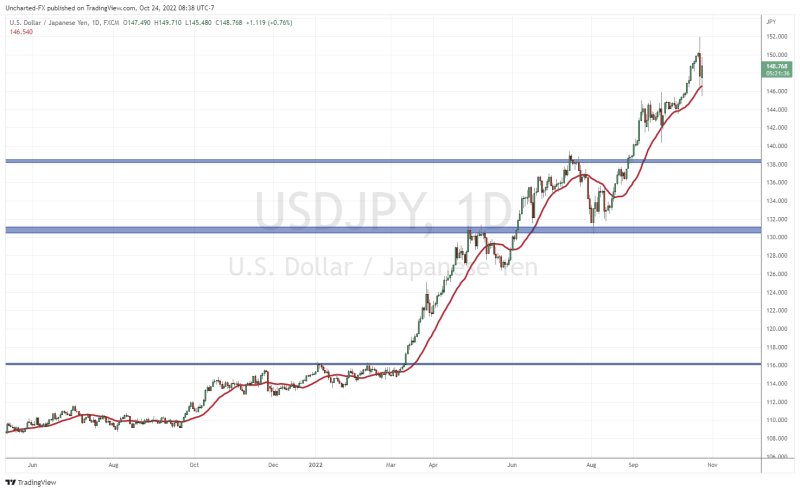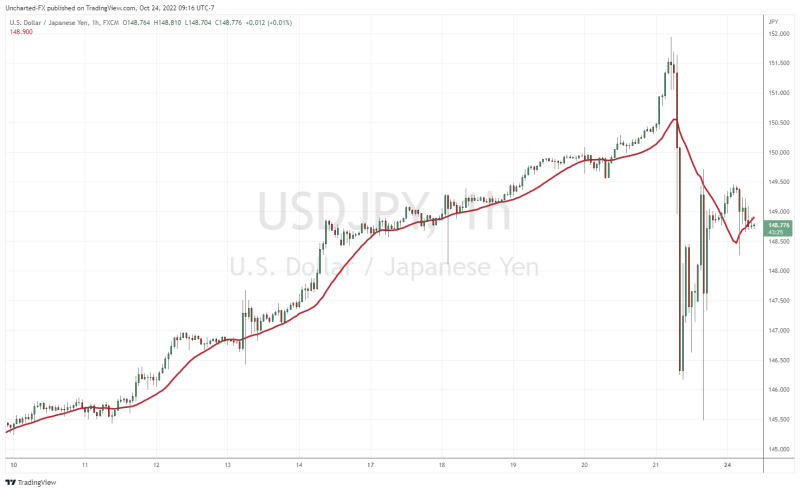Months ago, I warned readers that the Bank of Japan is the most important central bank to be watching. I even did a video explaining why every trader must be watching the Bank of Japan (BoJ).
Nobody really cared much about the BoJ since their monetary policy meetings never changed. But things could be changing.
Already this year we have seen the BoJ announce unlimited bond buying to keep 10 year Japanese Government Bonds (JGBs) from rising above 0.25%.

So far they have done a good job. Here’s a reminder of the doubling down of dovish policy the BoJ announced:
- The short-term policy interest rate: The Bank will apply a negative interest rate of minus 0.1 percent to the Policy-Rate Balances in current accounts held by financial institutions at the Bank.
- The long-term interest rate: The Bank will purchase a necessary amount of Japanese government bonds (JGBs) without setting an upper limit so that 10-year JGB yields will remain at around zero
percent. - In order to implement the above guideline for market operations, the Bank will offer to purchase 10-year JGBs at 0.25 percent every business day through fixed-rate purchase operations, unless it is highly likely that no bids will be submitted.
The big story has been the decline of the Japanese Yen, which is seeing lows not seen since 1990.

Above is the chart of the USDJPY. The Yen has been weakening against the US dollar, but also has been weakening against other major currencies.
The reason is simple: interest rate differentials. A higher interest rate will cause money to run into the higher yielding currency. With pretty much all western central banks raising interest rates and the BoJ remaining at -0.1%, it is obvious where money will flow. For a currency trader, you even get an overnight positive swap holding a higher yielding currency against the Yen. Much higher swap on the USDJPY.
What does this mean for Japan? Well, we need to talk about the ‘I’ word, inflation. Before supply chains and blaming Russia, inflation was usually associated with a monetary phenomenon. A weak currency increased inflation. Basically, it takes more of a weaker currency to buy the same amount of goods hence higher prices.
For Japan a weaker Yen could have huge ramifications. Yes, Japanese products are much cheaper so exports could increase. Although the slowing down of the global economy may dampen this. An important factor is that Japan imports a lot of commodities. Especially energy. Energy which is traded in US dollars. US dollars which is now much more expensive for Japan due to the weakening Yen.
In geopolitics, this stronger dollar may cause nations to look for alternatives. Russia selling energy for any currency could look appealing to Japan.
Mind you, a stronger US dollar will not just impact Japan. We are seeing pretty much all Asian currencies crater against the Dollar. Even in Europe we are seeing the Euro and the British Pound crater. This is a larger macro theme that is referred to as the “Dollar milkshake theory”.
A stronger dollar may cause US allies to gang up and force some sort of new Plaza Accord which would see the US dollar devalue. But I am getting ahead of myself.
Let’s stick to Japan. A lot of people are awaiting the Fed rate announcement next week Wednesday (November 2nd). But the BoJ rate decision this week could be market moving.
Once again, the BoJ continues to buy bonds, and they have done one currency intervention. The Yen continues to weaken. What else can the BoJ do to prop the Yen? Not much in my opinion. They really need to either increase interest rates, which would cause a financial mess around the world since Japanese investors are large buyers of US debt and other western debt. Or, and more likely, will wait it out for the other central banks to pivot.

On Sunday evening (Monday morning for Asia), there was a strong bid for the Yen. It went from 151.51 down to 146.50 in less than two hours. The BoJ was definitely involved. A second currency intervention to prop the Yen… which has just seen traders buy the dip. It appears as if the 150 zone is the zone the BoJ wants to defend.
There is some speculation that Japan’s Ministry of Finance sold securities to fund the move as the authorities did in September. There’s also the possibility the Bank of Japan drained ready funds parked at the Federal Reserve’s foreign reverse repurchase agreement facility.
“The worry is that even if the BOJ has cash for intervention now, the rate at which they are intervening will require them to sell more Treasuries for future interventions,” said TD Securities strategist Gennadiy Goldberg. “That’s really what’s driving the fear.”
Key point. Japan will need to sell foreign reserves to prop the Yen. Japan is the number 1 holder of US treasuries. When US treasuries are sold off, yields spike. And a higher yield will cause stock markets to drop.
The bond markets are super important as interest rates rise. We even saw a recent situation where the Bank of England had to intervene in the Gilt market to prevent yields from spiking.
The BoJ has the ability to spike US yields if it sells off US treasuries. Could US investors scoop up sold off treasuries? Possibly, but you need to consider that many of them are thinking that yields still don’t beat inflation.
The big question is will the Fed pivot or reverse and initiate some sort of bond buying program. Basically, are things close to breaking?
Many questions to consider as central banks must continue to raise rates and keep them higher for longer to tame inflation (unless we get some major demand killing event!). But to me, it just appears as if something is about to break in the bond markets. Will the BoJ be the ones to initiate? Time will tell.

